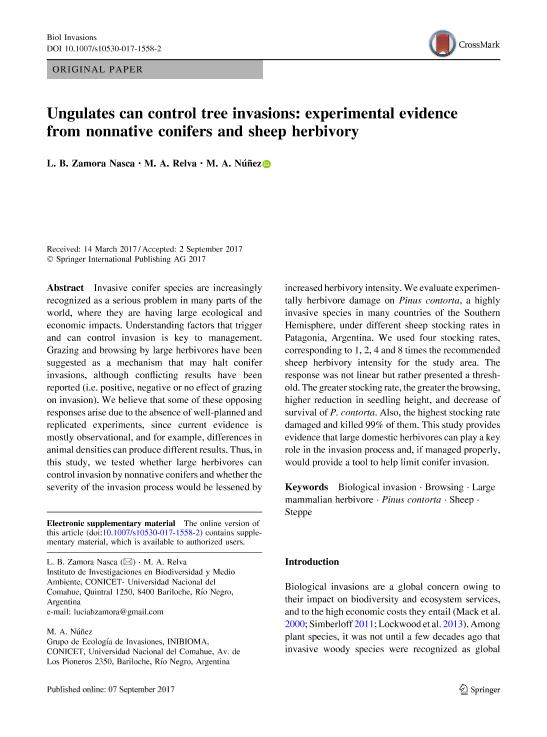Mostrar el registro sencillo del ítem
dc.contributor.author
Zamora Nasca, Lucía Belén

dc.contributor.author
Relva, Maria Andrea

dc.contributor.author
Nuñez, Martin Andres

dc.date.available
2018-11-13T18:53:57Z
dc.date.issued
2017-09
dc.identifier.citation
Zamora Nasca, Lucía Belén; Relva, Maria Andrea; Nuñez, Martin Andres; Ungulates can control tree invasions: experimental evidence from nonnative conifers and sheep herbivory; Springer; Biological Invasions; 20; 3; 9-2017; 583-591
dc.identifier.issn
1387-3547
dc.identifier.uri
http://hdl.handle.net/11336/64378
dc.description.abstract
Invasive conifer species are increasingly recognized as a serious problem in many parts of the world, where they are having large ecological and economic impacts. Understanding factors that trigger and can control invasion is key to management. Grazing and browsing by large herbivores have been suggested as a mechanism that may halt conifer invasions, although conflicting results have been reported (i.e. positive, negative or no effect of grazing on invasion). We believe that some of these opposing responses arise due to the absence of well-planned and replicated experiments, since current evidence is mostly observational, and for example, differences in animal densities can produce different results. Thus, in this study, we tested whether large herbivores can control invasion by nonnative conifers and whether the severity of the invasion process would be lessened by increased herbivory intensity. We evaluate experimentally herbivore damage on Pinus contorta, a highly invasive species in many countries of the Southern Hemisphere, under different sheep stocking rates in Patagonia, Argentina. We used four stocking rates, corresponding to 1, 2, 4 and 8 times the recommended sheep herbivory intensity for the study area. The response was not linear but rather presented a threshold. The greater stocking rate, the greater the browsing, higher reduction in seedling height, and decrease of survival of P. contorta. Also, the highest stocking rate damaged and killed 99% of them. This study provides evidence that large domestic herbivores can play a key role in the invasion process and, if managed properly, would provide a tool to help limit conifer invasion.
dc.format
application/pdf
dc.language.iso
eng
dc.publisher
Springer

dc.rights
info:eu-repo/semantics/openAccess
dc.rights.uri
https://creativecommons.org/licenses/by-nc-sa/2.5/ar/
dc.subject
Biological Invasion
dc.subject
Browsing
dc.subject
Large Mammalian Herbivore
dc.subject
Pinus Contorta
dc.subject
Sheep
dc.subject
Steppe
dc.subject.classification
Otras Ciencias Biológicas

dc.subject.classification
Ciencias Biológicas

dc.subject.classification
CIENCIAS NATURALES Y EXACTAS

dc.title
Ungulates can control tree invasions: experimental evidence from nonnative conifers and sheep herbivory
dc.type
info:eu-repo/semantics/article
dc.type
info:ar-repo/semantics/artículo
dc.type
info:eu-repo/semantics/publishedVersion
dc.date.updated
2018-10-23T16:18:13Z
dc.identifier.eissn
1573-1464
dc.journal.volume
20
dc.journal.number
3
dc.journal.pagination
583-591
dc.journal.pais
Alemania

dc.journal.ciudad
Berlin
dc.description.fil
Fil: Zamora Nasca, Lucía Belén. Consejo Nacional de Investigaciones Científicas y Técnicas. Centro Científico Tecnológico Conicet - Patagonia Norte. Instituto de Investigaciones en Biodiversidad y Medioambiente. Universidad Nacional del Comahue. Centro Regional Universidad Bariloche. Instituto de Investigaciones en Biodiversidad y Medioambiente; Argentina
dc.description.fil
Fil: Relva, Maria Andrea. Consejo Nacional de Investigaciones Científicas y Técnicas. Centro Científico Tecnológico Conicet - Patagonia Norte. Instituto de Investigaciones en Biodiversidad y Medioambiente. Universidad Nacional del Comahue. Centro Regional Universidad Bariloche. Instituto de Investigaciones en Biodiversidad y Medioambiente; Argentina
dc.description.fil
Fil: Nuñez, Martin Andres. Consejo Nacional de Investigaciones Científicas y Técnicas. Centro Científico Tecnológico Conicet - Patagonia Norte. Instituto de Investigaciones en Biodiversidad y Medioambiente. Universidad Nacional del Comahue. Centro Regional Universidad Bariloche. Instituto de Investigaciones en Biodiversidad y Medioambiente; Argentina
dc.journal.title
Biological Invasions

dc.relation.alternativeid
info:eu-repo/semantics/altIdentifier/doi/http://dx.doi.org/10.1007/s10530-017-1558-2
dc.relation.alternativeid
info:eu-repo/semantics/altIdentifier/url/https://link.springer.com/article/10.1007%2Fs10530-017-1558-2
Archivos asociados
